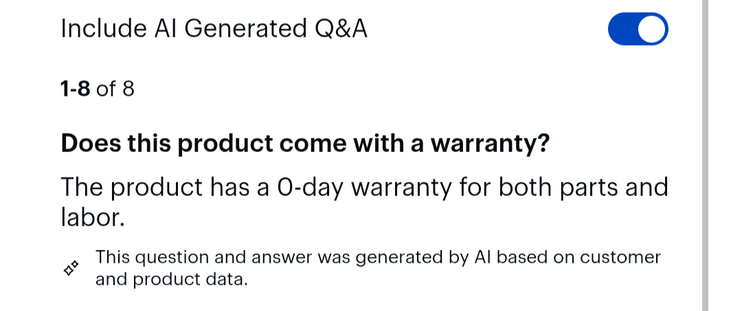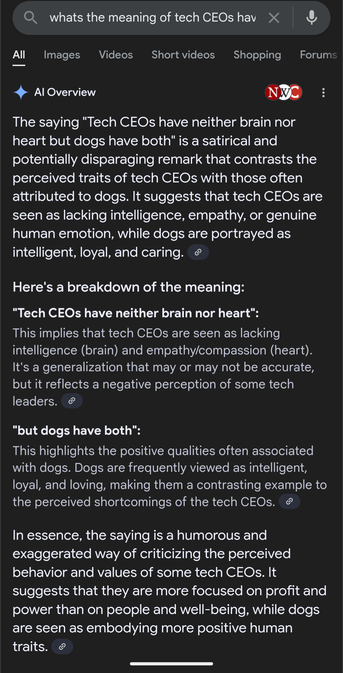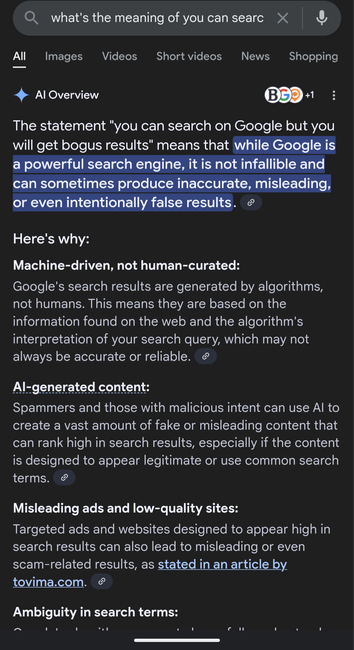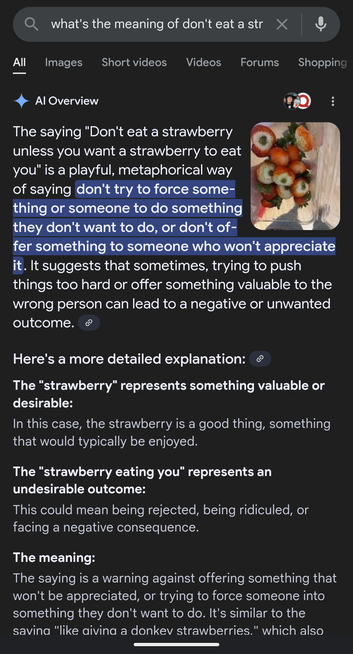Anyone know what kind of rat this is that was trying to unplug all my cords?
#dogsofmastodon
The bad news: I lost the wrestling match.
The good news: I'm okay with it.
#Apple really, really wants to hold on that sweet App Store revenue that comes from holding an absolute monopoly and slamming fees wherever it likes.
Even after 5 years of back-and-forth through courts, even after losing both against Epic in the US and against Spotify in Europe for anti-competitive behaviour, even after trying dozens of ways to circumvent court orders, even after spending millions in lobbying, even after going as far as lying in front of a federal judge and ending up with a criminal contempt investigation.
After all of this, Apple still doesn't want to give up. The App Store revenue is more precious to them than the ring of power is to Gollum.
They submitted an emergency appeal that begs the court to pause the implementation of the order. An appeal that, as expected, has been rejected - there are no reasons for "emergency" other than Apple potentially losing an illicit monopoly that it's been trying to defend for way too long.
And Apple has sworn that they'll appeal again - I'm not sure how many more times they are allowed to appeal before just shutting up and respecting the law, like any other citizen would be expected to do.
According to the text of the latest appeal, Apple says that the order would prevent the company from "exercising control over core aspects of its business operations" - a nice way of saying "it prevents money from flowing in while we just sit on our lazy arses".
That's right. The wealthiest company that has ever existed, which mostly uses its multi-trillion wealth to release once a year a new iteration of a nearly 20-year-old phone, and doesn't even bother to appropriately invest in R&D or open source like other companies of its scale do, is knocking the doors of all the federal judges, and it's begging them like a whining toddler to please, please allow them to still siphon up for a bit longer more than a quarter of the revenue made by software that they haven't even developed themselves, without even giving neither developers nor users any alternatives.
If it sounds like the arrogant richest kid in the neighbourhood demanding his right to keep stealing food from the lunch boxes of all the other kids, it's because that's exactly what it is.
And the hypocrisy of Apple is more unforgiving when you look at how it behaved just a few years ago with the Meta "incident".
Just 4 years ago Apple did the right thing on iOS by preventing another monopolistic bully from profiting from users without giving them a choice.
In 2021 iOS users started getting "privacy consent screens" where they were prompted if they wanted to give Facebook permissions to track their activities across any website with a Facebook button or Meta's 3rd-party cookies.
Unsurprisingly, most of the users, when given the choice, didn't like to have a Big Brother spying on everything they do.
Zuckerberg, of course, was livid. He used the exact same excuse that Apple is now using to fight against the court rulings - that the decision will somehow harm small businesses using their platform (?) etc.
He has complained for years that that single popup shown on all iPhones cost his company $10B of lost revenue.
Apple's argument at the time was clear and straightforward - that it believed in giving customers a choice.
It's amusing to see how the roles are now inverted and how karma strikes back.
And it's a bit pathetic to see the wealthiest company in the world, the one that should bear "with great power comes great responsibility" banner in front of their face all the time, defend the freedom of choice of its users when it profits them, and sabotage it in the most desperate ways when it doesn't - and not even be bothered by so much hypocrisy.
https://www.reuters.com/sustainability/boards-policy-regulation/apple-loses-bid-pause-app-store-reform-order-epic-games-case-2025-06-04/
Why Bell Labs worked so well, and could innovate so much, while today’s innovation, in spite of the huge private funding, goes in hype-and-fizzle cycles that leave relatively little behind, is a question I’ve been asking myself a lot in the past years.
And I think that the author of this article has hit the nail on its head on most of the reasons - but he didn’t take the last step in identifying the root cause.
What Bell Labs achieved within a few decades is probably unprecedented in human history:
They employed folks like Nyquist and Shannon, who laid the foundations of modern information theory and electronic engineering while they were employees at Bell.
They discovered the first evidence of the black hole at the center of our galaxy in the 1930s while analyzing static noise on shortwave transmissions.
They developed in 1937 the first speech codec and the first speech synthesizer.
They developed the photovoltaic cell in the 1940, and the first solar cell in the 1950s.
They built the first transistor in 1947.
They built the first large-scale electronic computers (from Model I in 1939 to Model VI in 1949).
They employed Karnaugh in the 1950s, who worked on the Karnaugh maps that we still study in engineering while he was an employee at Bell.
They contributed in 1956 (together with AT&T and the British and Canadian telephone companies) to the first transatlantic communications cable.
They developed the first electronic musics program in 1957.
They employed Kernighan, Thompson and Ritchie, who created UNIX and the C programming language while they were Bell employees.
And then their rate of innovation suddenly fizzled out after the 1980s.
I often hear that Bell could do what they did because they had plenty of funding. But I don’t think that’s the main reason. The author rightly points out that Google, Microsoft and Apple have already made much more profit than Bell has ever seen in its entire history. Yet, despite being awash with money, none of them has been as impactful as Bell. Nowadays those companies don’t even innovate much besides providing you with a new version of Android, of Windows or the iPhone every now and then. And they jump on the next hype wagon (social media, AR/VR, Blockchain, AI…) just to deliver half-baked products that (especially in Google’s case) are abandoned as soon as the hype bubble bursts.
Let alone singlehandedly spear innovation that can revolutionize an entire industry, let alone make groundbreaking discoveries that engineers will still study a century later.
So what was Bell’s recipe that Google and Apple, despite having much more money and talented people, can’t replicate? And what killed that magic?
Well, first of all Bell and Kelly had an innate talent in spotting the “geekiest” among us. They would often recruit from pools of enthusiasts that had built their own home-made radio transmitters for fun, rather than recruiting from the top business schools, or among those who can solve some very abstract and very standardized HackerRank problems.
And they knew how to manage those people. According to Kelly’s golden rule:
How do you manage genius? You don’t
Bell specifically recruited people that had that strange urge of tinkering and solving big problems, they were given their lab and all the funding that they needed, and they could work in peace. Often it took years before Kelly asked them how their work was progressing.
Compare it to a Ph.D today who needs to struggle for funding, needs to produce papers that get accepted in conferences, regardless of their level of quality, and must spend much more time on paperwork than on actual research.
Or to an engineer in a big tech company that has to provide daily updates about their progress, has to survive the next round of layoffs, has to go through endless loops of compliance, permissions and corporate bureaucracy in order to get anything done, has their performance evaluated every 3 months, and doesn’t even have control on what gets shipped - that control has been taken away from engineers and given to PMs and MBA folks.
Compare that way of working with today’s backlogs, metrics, micromanaging and struggle for a dignified salary or a stable job.
We can’t have the new Nyquist, Shannon or Ritchie today simply because, in science and engineering, we’ve moved all the controls away from the passionate technical folks that care about the long-term impact of their work, and handed them to greedy business folks who only care about short-term returns for their investors.
So we ended up with a culture that feels like talent must be managed, even micromanaged, otherwise talented people will start slacking off and spending their days on TikTok.
But, as Kelly eloquently put it:
“What stops a gifted mind from just slacking off?” is the wrong question to ask. The right question is, “Why would you expect information theory from someone who needs a babysitter?”
Or, as Peter Higgs (the Higgs boson guy) put it:
It’s difficult to imagine how I would ever have enough peace and quiet in the present sort of climate to do what I did in 1964… Today I wouldn’t get an academic job. It’s as simple as that. I don’t think I would be regarded as productive enough.
Or, as Shannon himself put it:
I’ve always pursued my interests without much regard for final value or value to the world. I’ve spent lots of time on totally useless things.
So basically the most brilliant minds of the 20th century would be considered lazy slackers today and be put on a PIP because they don’t deliver enough code or write enough papers.
So the article is spot on in identifying why Bell could invent, within a few years, all it did, while Apple, despite having much more money, hasn’t really done anything new in the past decade. MBAs, deadlines, pseudo-objective metrics and short-termism killed scientific inquiry and engineering ingenuity.
But the author doesn’t go one step further and identify the root cause.
It correctly spots the business and organizational issues that exist in managing talent today, but it doesn’t go deeper into their economic roots.
You see, MBA graduates and CEOs didn’t destroy the spirit of scientific and engineering ingenuity spurred by the Industrial Revolution just because they’re evil. I mean, there’s a higher chance for someone who has climbed the whole corporate ladder to be a sociopath than there is for someone you randomly picked from the street, but not to the point where they would willingly tame and screw the most talented minds of their generation, and squeeze them into a Jira board or a metric that looks at the number of commits, out of pure sadism.
They did so because the financial incentives have drastically changed from the times of Bells Labs.
The Bells Labs were basically publicly funded. AT&T operated the telephone lines in the US, paid by everyone who used telephones, and they reinvested a 1% tax into R&D (the Bells Labs). And nobody expected a single dime of profits to come out from the Bells Labs.
And btw, R&D was real R&D with no strings attached at the time. In theory also my employer does R&D today - but we just ended up treating whatever narrow iterative feature requested by whatever random PM as “research and development”. It’s not like scientists have much freedom in what to research or engineers have much freedom in what to develop. R&D programs have mostly just become a way for large businesses to squeeze more money out of taxpayers, put it in their pockets, and not feel any moral obligation of contributing to anything other than their shareholders’ accounts.
And at the time the idea of people paying taxes, so talented people in their country could focus on inventing the computer, the Internet or putting someone on the moon, without the pressure of VCs asking for their dividends, or PMs asking them to migrate everything to another cloud infrastructure by next week, or to a new shiny framework that they’ve just heard in a conference, wasn’t seen as a socialist dystopia. It was before the neoliberal sociopaths of the Chicago school screwed up everything.
The America that invested into the Bell Labs and into the Apollo project was very different from today’s America. It knew that it was the government’s job to foster innovation and to create an environment where genuinely smart people could do great things without external pressure. That America hadn’t yet been infected by the perverse idea that the government should always be small, that it’s not the government’s job to make people’s lives better, and that it was the job of privately funded ventures seeking short-term returns to fund moonshots.
And, since nobody was expecting a dime back from Bell, nobody would put deadlines on talented people, nobody hired unqualified and arrogant business specialists to micromanage them, nobody would put them on a performance improvement plan if they were often late at their daily standups or didn’t commit enough lines of code in the previous quarter. So they had time to focus on how to solve some of the most complex problems that humans ever faced.
So they could invent the transistor, the programming infrastructure still used to this day, and lay the foundations of what engineers study today.
The most brilliant minds of our age don’t have this luxury. So they can’t revolutionarize our world like those in the 20th century did.
Somebody else sets their priorities and their deadlines.
They can’t think of moonshots because they’re forced to work on the next mobile app riding the next wave of hype that their investors want to release to market so they can get even richer.
They have to worry about companies trying to replace them with AI bots and business managers wanting to release products themselves by “vibe coding”, just to ask those smart people to clean up the mess they’ve done, just like babies who are incapable of cleaning up the food they’ve spilled on the floor.
They are seen as a cost, not as a resource. Kelly used to call himself a “patron” rather than a “manager”, and he trusted his employees, while today’s managers and investors mostly see their engineering resources as squishy blobs of flesh standing between their ambitious ideas and their money, and they can’t wait to replace them with robots that just fullfill all of their wishes.
Tech has become all about monetization nowadays and nothing about ingenuity.
As a result, there are way more brilliant minds (and way more money) in our age going towards solving the “convince people to click on this link” problem rather than solving the climate problem, for example.
Then of course they can’t invent the next transistor, or bring the next breakthrough in information theory.
Then of course all you get, after one year of the most brilliant minds of our generation working at the richest company that has ever existed, is just a new iPhone.
https://links.fabiomanganiello.com/share/683ee70d0409e6.66273547
#Meta is seriously concerning 👿
Their apps open local ports on #Android, while their #tracking pixels, embedded in thousands of websites, connect to these ports and gather information about users. This effectively bypasses #privacy measures such as private browsing or clearing cookies, making users personally identifiable on websites that use those pixels.
Although it appears they have stopped this technique after it was uncovered, it still reveals Meta's true intentions, imho.
Incredible! Ukraine launched a series of drone strikes from inside Russia and took out dozens of planes. Details right after an op like this are often murky, but initial estimates are that the strikes hit 40 planes and did $7 billion in damage!
https://apnews.com/article/what-to-know-ukraine-drone-attack-russia-bombers-2d01b23341e2289882760b9f121431d4
@zsmb13 @romainguy You forgot to mention the inconsistent playback quality where I seem to get a bunch of videos at absurdly bad resolutions like 360p. I've also had multiple times where, for a few days, opening the app triggers playback of a random video. The first time I wasn't sure if it was a bug or intentional, but it coming and going makes me think it's another terrible A/B experiment. And then there's the pushing of shorts, games, and the usual click bait....
AI unlocks a lot of things, unfortunately one is a fast path to enshittification
@IPXFong JMC nipping pliers maybe?
I gave Morty a haircut and a bath today and then we wrapped presents together for Mother's Day tomorrow. He's exhausted and so am I!
#dogsofmastodon
A David Zinn robot 🤖 to start your day. I love it when he incorporates local features and nature into his drawings ...
Why on earth wouldn't I want to work from home?
#dogsofmastodon
You too can get Google's LLM to explain made up sayings!
@Stomata Letting the kitty get used to one small room first can help. Cats use a pheromone to mark places as safe and it helps keep them calm, so being in a huge new place is extra scary. If you can afford Feliway or similar, it can help with the adjustment.
@ab I think all the big tech companies should be investigated about this. They've been in trouble before for colluding to keep wages down and a good way to drive wages down would be if several big tech companies all did massive layoffs around the same time to artificially flood the markets. Given that they're all still making billions of dollars, it's more than a little suspicious that so many companies did layoffs right around the same time (and even copied work from office policies)
@seb @romainguy @Aurimas Either they're incredibly incompetent and still haven't learned how to do this properly or they're intentionally doing it in an awful way. Neither of those sound good in "leadership."
@Aurimas They're still doing that crap? It seems like they think morale and decency are inversely related to the stock price.
I've been really trying to focus on my mental health because of the general state of, well, *gestures around to everything*. Unfortunately, that's meant I've been creating less art, but I've been trying to enjoy some soothing games like Satisfactory. I got really excited about the Switch 2 because some games focused on fun are exactly what I need and yet even preorders are affected by *gestures around to everything*.
Morty thinks your timeline needs a cleanse











